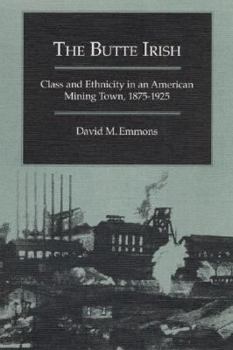The Butte Irish: Class and Ethnicity in an American Mining Town, 1875-1925
(Part of the Statue of Liberty -- Ellis Island Centennial Series Series)
Select Format
Select Condition 
Book Overview
In this pioneering study, David Emmons tells the story of Butte's large and assertive population of Irish immigrants. He traces their backgrounds in Ireland, the building of an ethnic community in Butte, the nature and hazards of their work in the copper mines, and the complex interplay between Irish nationalism and worker consciousness.
From a treasure trove of "Irish stuff," the reports, minutes, and correspondence of the major Irish-American...
Format:Paperback
Language:English
ISBN:0252061551
ISBN13:9780252061554
Release Date:February 1989
Publisher:University of Illinois Press
Length:464 Pages
Weight:1.41 lbs.
Dimensions:1.1" x 6.0" x 9.0"
Customer Reviews
1 rating
a very good pic. of the development of Butte as an Irishtown
Published by Thriftbooks.com User , 25 years ago
David M. Emmons, in The Butte Irish, examines the development of Butte, Montana, as an Irish town, tracing the story from the Potato Famine to about 1925. He focuses on two major questions: (a) What made Butte such a popular destination for Irish immigrants, both directly from Ireland and from other Irish areas of the US? and, (b) How did the development of an Irish enclave in Butte affect the development of the city? He goes on to examine the evolution of class relations within the Irish in Butte. Emmons describes Butte as a unique location in America for the study of an ethnic community. He argues that the town developed in such a way and at such a time that it was one of the only towns in the country to have a strong working-class, immigrant community in a position of major influence and power. There were several keys that made this path of city evolution possible. The first was the switch from silver and gold mining to copper production in the 1870's. This is key for Butte's "Irishness" on several levels. First, because of the large capital investment required for copper mining, Butte was forced to industrialize to a much greater extent than other major gold and silver mining camps of the West. Thus, Butte was the only one of these mining camps to become a major city. Immigrants from many of these camps came to Butte in large numbers. The timing of the beginning of Butte's copper era is a second major factor. The Irish Potato Famine of the 1840's caused huge numbers of Irish to immigrate to America. In the years immediately following the famine, the Irish were nearly forty percent of those immigrating to the United States. Large numbers of Irish continued to immigrate in the next thirty years, supplying the US with many unskilled workers. Many of these Irish went to the mining camps of the west, the coal mines of Pennsylvania, or the copper mines of Michigan, because mining was one of the only industries they were familiar with. As many of the western mining camps became "played out," or ran out of viable ore, in the late nineteenth century, the Irish looked to the developing Butte. Because Butte was becoming an established city only when the Irish started going there, it did not have a previously existing community of entrenched middle class Americans, nor did it have a prior political structure. This is another key difference between Butte and other towns with sizable Irish populations such as Boston or San Francisco. In pre-existing towns and cities, the middle class often looked down on those of the working class, or at least had control of the political and social structure of the area. It is a well-known fact that Marcus Daly was one of the main reasons so many Irish came to Butte. Daly was the owner of the Anaconda Mining Company, and a strong Irish nationalist. His hiring policies were famous throughout the West, and even in Ireland, as being very ge






